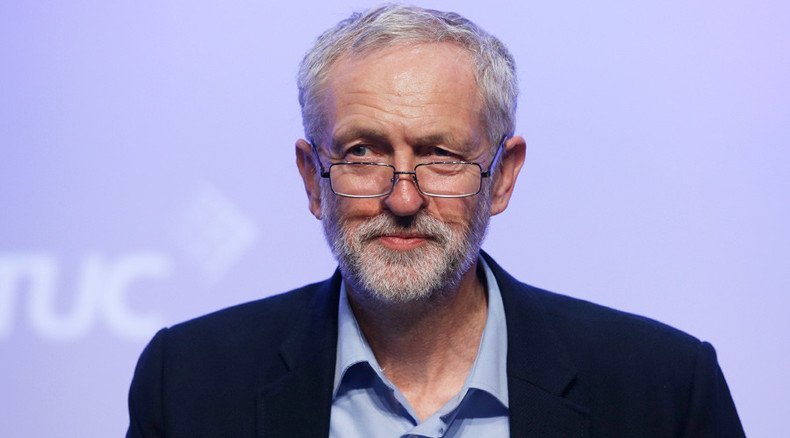Damage limitation? City bankers seek to charm anti-austerity Corbyn

City financiers are hatching plans to influence Jeremy Corbyn’s economic policies, as the anti-austerity Labour leader settles into his new role.
A string of policy briefings and one-to-one meetings with senior financiers are on the table, as Corbyn, newly-appointed shadow chancellor John McDonnell and shadow business minister Angela Eagle prepare to realign Labour’s policy compass.
Following Corbyn’s resounding victory on September 12, City punters are fearful the new Labour leader fails to grasp the importance of Britain’s financial sector.
.@DefenceHQ: I take it you're urgently investigating the threat of a mutiny/ coup by a general in the Sunday Times, if Corbyn becomes PM?
— GeorgeMonbiot (@GeorgeMonbiot) September 20, 2015The UK’s financial sector and associated professional services are estimated to generate £66 billion (US$102 billion) in tax revenues and 2.1 million jobs – and are vital to the overall health of the British economy, according to lobby group TheCityUK.
Speaking on Monday, chief of TheCityUK Chris Cummings said the time had come to connect with Labour under Corbyn’s stewardship.
“Even though it is five years until the next general election, we’re taking the view that this is the time to engage,” he told the Financial Times.
"As Corbyn says, austerity was not inevitable: it was a political decision." http://t.co/vnALzJyaq6 Bill Keegan gets it right
— Richard Murphy (@RichardJMurphy) September 20, 2015Chairman of the policy and resources committee at the City of London Corporation Mark Boleat added the body is eager to impact upon the new Labour leadership’s policy making.
“We are keen that the new Labour leadership understands the issues that concern City institutions — jobs in the City in particular, but also education, immigration and Europe. And we want to help inform their policymaking,” he told the FT.
Chancellor of the Exchequer George Osborne’s economic plan has long been criticized by right and left wing economists across the state. His policy path to date has been characterized by austerity, deregulation, privatization and tax breaks for big business.
By contrast, Corbyn argues austerity is a political choice, not a necessity. The Labour leader says austerity only serves to weaken the economy, hinder growth and damage future prosperity.
As the face of Labour’s leadership becomes apparent, City punters are determined to strike a rapport with the party’s newly-minted change-makers.
Labour under Jeremy Corbyn:
Against
- Austerity
- Tuition fees
- Welfare Bill
For
- Living wage
- Renationalising railways
- Ending poverty
— George Aylett (@GeorgeAylett) September 20, 2015Jeremy Adams, a committee member of Labour in the City, says financiers must begin by recognizing shared interests between the party and the City.
In particular, he said the use of capital to bolster the economy and create widespread prosperity represents important common ground.
While some City punters are eager to forge a relationship with Corbyn, others see little point. One senior banking official told the FT Corbyn’s policy prescriptions amount to an attempt to “overthrow capitalism.”
But Corbyn insists he is not anti-business, as some critics have suggested. Rather, he says he backs progressive economic policies that will spur growth, investment and increased levels of equality.
Should he become prime minister, Corbyn says he would close the deficit by creating a strong, growing economy that benefits all. In particular, he backs increased investment, arguing faster growth and better wages are key to reducing the state’s deficit.
By asking Britain’s most prosperous to contribute more to the state’s public services, Corbyn says the community’s most vulnerable could be better protected.
Every candidate other than Mr. Corbyn supported Conservative government’s austerity policies, writes Paul Krugman. http://t.co/MOQLThjfzz
— Ann Pettifor (@AnnPettifor) September 14, 2015Corbyn also proposes a drastic remodeling of the economy, which would channel public investment into publicly-owned infrastructure and ensure wealth is distributed more evenly. He says this rebalancing would shift the state’s economic compass away from finance and towards sustainable, high-growth sectors.
Without such intervention, he warns, Britons will remain burdened by a casino economy, chronic underinvestment, inflated debt and deep inequality.
Corbyn’s critics warn that he and McDonnell are misguided left-wingers. Speaking at a rally in Brighton, McDonnell recently described bankers as “jokers.” The Labour shadow chancellor also previously called for the nationalization of Britain’s banks.
But such a maneuver is far from City punters’ agenda. The British Bankers Association says the trade group has no plans to focus on nationalizing the state’s banking sector and would await formal approval before making such a move.












